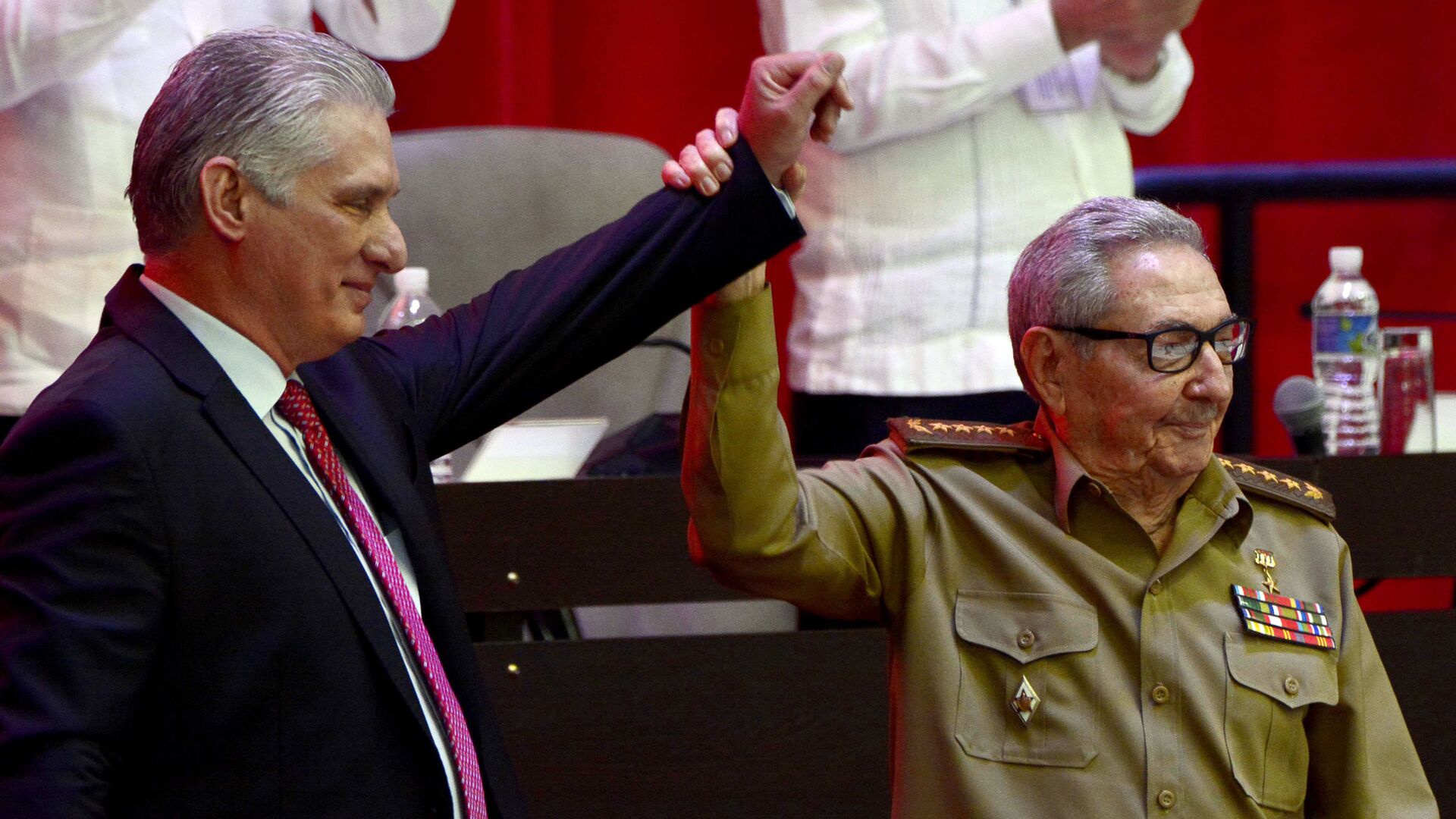https://sputnikglobe.com/20210711/cuban-president-calls-on-supporters-to-hit-streets-oppose-provocations-1083362551.html
Cuban Leader Calls on Supporters to Hit Streets, Oppose Provocations - Videos
Cuban Leader Calls on Supporters to Hit Streets, Oppose Provocations - Videos
Sputnik International
As citizens took to the streets on Sunday to demand improvement of economic conditions in the country amid the COVID-19 outbreak, it is worth noting Cuba has... 11.07.2021, Sputnik International
2021-07-11T20:53+0000
2021-07-11T20:53+0000
2023-03-29T10:37+0000
world
newsfeed
us
latin america
revolution
left-wing
island
pandemic
sanctions
cuba
https://cdn1.img.sputnikglobe.com/img/07e5/07/0b/1083362601_0:150:3107:1898_1920x0_80_0_0_a4ac840e3cdb4be34e347014cd21faa0.jpg
Cuban President Miguel Diaz-Canel called for his supporters to take to the streets on Sunday after accusing enemies of the Cuban Revolution of trying to destabilize the Caribbean nation."We are calling on all Communists to take to the streets where these provocations are being staged and oppose them," he said, referring to protests that are reportedly taking place in several cities.Citizens took to the streets across the country on Sunday to oppose poor economic conditions and the government's handling of the COVID-19 pandemic. The nation has faced shortages of food and essential products as its health industry is going through difficult times.Under the so-called Cuban Democracy Act of 1992, foreign-based subsidiaries of US companies are prohibited from selling their products to Cuba. Cuban Permanent Representative to the United Nations Pedro Luis Pedroso Cuesta told Sputnik earlier that under the so-called Cuban Democracy Act of 1992, foreign-based subsidiaries of US companies are prohibited from selling their products to Cuba.According to local media reports, protests and crowds have been reported in eight cities on the island, including Havana, and no major incidents have been reported.The United States imposed trade restrictions on Cuba in the late 1950s in response to the communist revolution. Ex-US President Barack Obama made small steps towards normalizing relations with its neighbor, but the Trump administration reversed many of those.US President Joe Biden has vowed to continue Obama's policies, but no significant steps have been made in that direction so far. Given the overall support of the ongoing unrest and decades-long rejection of any possibility for a socialist government in its backyard, it is highly unlikely the current administration will try to normalize relations.On June 23, the United States voted against a UN General Assembly resolution condemning the embargo on Cuba that was adopted by the overwhelming majority of 184 other nations.
cuba
Sputnik International
feedback@sputniknews.com
+74956456601
MIA „Rossiya Segodnya“
2021
Sputnik International
feedback@sputniknews.com
+74956456601
MIA „Rossiya Segodnya“
News
en_EN
Sputnik International
feedback@sputniknews.com
+74956456601
MIA „Rossiya Segodnya“
Sputnik International
feedback@sputniknews.com
+74956456601
MIA „Rossiya Segodnya“
newsfeed, us, latin america, revolution, left-wing, island, pandemic, sanctions, cuba
newsfeed, us, latin america, revolution, left-wing, island, pandemic, sanctions, cuba
Cuban Leader Calls on Supporters to Hit Streets, Oppose Provocations - Videos
20:53 GMT 11.07.2021 (Updated: 10:37 GMT 29.03.2023) As citizens took to the streets on Sunday to demand improvement of economic conditions in the country amid the COVID-19 outbreak, it is worth noting Cuba has been under a US embargo for almost 60 years, which has prevented the arrival of humanitarian aid in the island nation during the pandemic.
Cuban President Miguel Diaz-Canel called for his supporters to take to the streets on Sunday after accusing enemies of the Cuban Revolution of trying to destabilize the Caribbean nation.
"We will not let anti-revolutionary mercenaries who are beholden to the American empire to create instability. There will be a revolutionary response," he said in a televised address to the nation.
"We are calling on all Communists to take to the streets where these provocations are being staged and oppose them," he said, referring to protests that are reportedly taking place in several cities.
Citizens took to the streets across the country on Sunday to oppose poor economic conditions and the government's handling of the COVID-19 pandemic. The nation has faced shortages of food and essential products as its health industry is going through difficult times.
Under the so-called Cuban Democracy Act of 1992, foreign-based subsidiaries of US companies are prohibited from selling their products to Cuba. Cuban Permanent Representative to the United Nations Pedro Luis Pedroso Cuesta told Sputnik earlier that under the so-called Cuban Democracy Act of 1992, foreign-based subsidiaries of US companies are prohibited from selling their products to Cuba.
According to local media reports, protests and crowds have been reported in eight cities on the island, including Havana, and no major incidents have been reported.
Meanwhile, US politicians took to Twitter to support the mass protests in the island nation, calling on the American government to support Cubans against the "communist dictatorship".
The United States imposed trade restrictions on Cuba in the late 1950s in response to the communist revolution. Ex-US President Barack Obama made small steps towards normalizing relations with its neighbor, but the Trump administration reversed many of those.
US President Joe Biden has vowed to continue Obama's policies, but no significant steps have been made in that direction so far. Given the overall support of the ongoing unrest and decades-long rejection of any possibility for a socialist government in its backyard,
it is highly unlikely the current administration will try to normalize relations.
The Russian Foreign Ministry condemned the US policies of violating human rights abroad earlier this week, which is epitomized in the harsh economic sanctions against states Washington deems "not free", with the most "egregious example" being the imposed and ongoing (despite numerous UN General Assembly resolutions) blockade of Cuba.
On June 23, the United States voted against a UN General Assembly resolution condemning the embargo on Cuba that was adopted by the overwhelming majority of 184 other nations.


